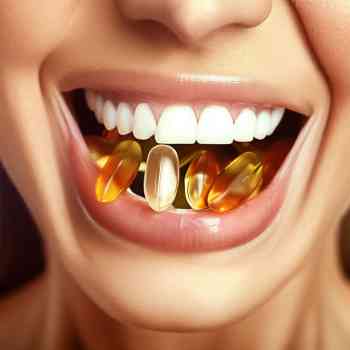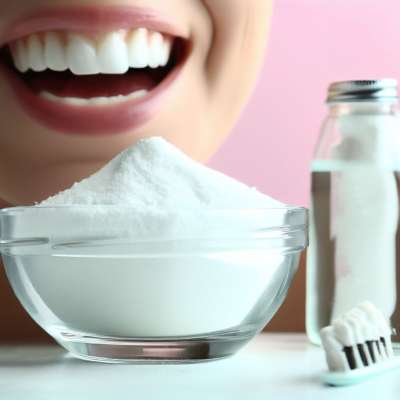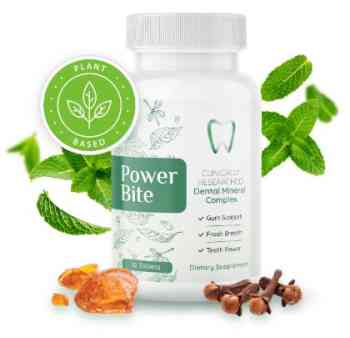Unlocking the Secrets: Best Vitamins for Strong Teeth and a Radiant Smile!

Strong teeth are foundational for a radiant smile and overall oral health. The foods we consume play a pivotal role in maintaining dental wellness. Surprisingly, only some know the essential vitamins that promote robust dental health. Incorporating nutrients into one’s diet can significantly benefit tooth strength and longevity. This exploration will shed light on the paramount vitamins vital for sturdy teeth. Discover which vitamins are the pillars for maintaining powerful pearly whites.
Disclaimer
AI has generated the content provided on this website and subsequently reviewed and edited by the website’s author. While every effort has been made to ensure accuracy, the author has not personally tested any products mentioned and does not claim expertise in dental supplements. It’s always recommended to consult with a dental or healthcare professional before making any changes to your routine or trying new supplements.
I. Toothsome Vitality: Unraveling the Best Vitamins for Strong Teeth
Dental health is often a reflection of our dietary choices. The food we consume daily can either bolster the strength of our teeth or weaken them, making us susceptible to various dental ailments.
A. The role of diet in dental health
Our mouth is a bustling ecosystem, home to various beneficial and harmful bacteria. The food we eat determines the balance of these bacterial populations. Sugary foods and beverages, for instance, feed harmful bacteria that produce acids, which can erode the tooth’s enamel. On the flip side, a balanced diet rich in certain vitamins and minerals can support the health of both our teeth and gums.
B. The significance of vitamins for tooth wellness
Vitamins play a pivotal role in the health of our teeth. They aren’t just essential for overall bodily functions and integral to maintaining our pearly whites’ strength, resilience, and shine. A deficiency in particular vitamins can lead to oral health issues such as gum diseases, tooth decay, and even tooth loss. Ensuring a regular intake of these vital nutrients is not merely a preventive measure but a proactive approach to holistic dental well-being.
II. Understanding the Anatomy of a Tooth
Before diving into the specifics of how vitamins influence dental health, it’s crucial to grasp the fundamental structure of a tooth and how each layer has its unique function and vulnerabilities.
A. Different layers of teeth and their functions
Teeth are not just the white crowns we see when we smile. Beneath the surface, they have a complex structure:
- Enamel: This is the outermost layer, a hard, protective shell, and the most mineralized tissue in the human body. It defends our teeth from the wear and tear of daily use, such as biting, chewing, and grinding.
- Dentin: Located directly beneath the enamel, dentin is a porous layer that transmits nerve signals. It’s easier than enamel but plays a crucial role in supporting it.
- Pulp: This innermost part houses the tooth’s nerve and blood vessels. It gives the tooth nutrients and can sense temperature, giving us hot and cold sensations.
B. How vitamins impact each layer
Vitamins play a multifaceted role in the well-being of each of these layers:
- Enamel: Vitamins, particularly minerals like calcium and phosphate, assist in maintaining the hardness and mineral density of the enamel, shielding it from decay.
- Dentin: Vitamins such as vitamin D help absorb calcium, ensuring the dentin remains strong and supportive.
- Pulp: Antioxidant vitamins, like vitamin C, aid in maintaining the health of blood vessels in the pulp, ensuring the tooth remains nourished and alive.
Understanding these intricacies aids in appreciating the significant role vitamins play in the minutiae of our dental health, establishing the foundation for our exploration into specific vitamins beneficial for sturdy teeth.
III. Essential Vitamins for Dental Strength
A vibrant smile and robust teeth aren’t merely a result of regular brushing and flossing. The vitamins we incorporate into our diets significantly influence our dental well-being.
A. Vitamin D: Sunshine for Your Smile
- Benefits to dental structure. Vitamin D plays a paramount role in our dental health. Its primary function in oral wellness is to aid the body in absorbing calcium—an essential mineral for teeth. Without sufficient vitamin D, our teeth could suffer from a lack of calcium, leading to weakened enamel and increased susceptibility to cavities.
- Food sources and recommended intake. Our bodies produce vitamin D when exposed to sunlight. However, dietary intake becomes crucial in regions with less sunlight or during winter months. Foods rich in vitamin D include fatty fish (salmon and mackerel), fortified dairy products, and egg yolks. The recommended daily intake varies by age, but generally, adults should aim for 600 to 800 IU/day.
B. Vitamin K: The Unsung Dental Hero
- Its role in tooth remineralization. Often overlooked, vitamin K2 plays a crucial role in oral health by aiding tooth remineralization. It helps direct calcium to the bones and teeth, ensuring they remain robust. Additionally, it helps reduce inflammation in the gums, mitigating risks associated with gum disease.
- Where to find Vitamin K. Green leafy vegetables, like kale and spinach, are packed with vitamin K1. Vitamin K2, more directly associated with oral health, can be found in fermented foods, cheeses, and animal products like meat and eggs.
C. Vitamin C: More than Just for Colds
- Gum health and collagen synthesis. Vitamin C is essential for producing collagen, a protein that aids in maintaining the health and strength of our gums. A deficiency can lead to gum inflammation and bleeding, symptoms of scurvy. Moreover, vitamin C is an antioxidant, combating harmful free radicals in the mouth.
- Natural reservoirs of Vitamin C., Citrus fruits like oranges, lemons, and grapefruits are rich sources. Other vitamin C-rich foods include strawberries, bell peppers, and broccoli. A daily intake of 65-90mg is usually recommended for adults.
D. Calcium: The Building Block
- Prominence in tooth structure. Calcium is the primary mineral present in our teeth. It gives structure to the enamel, making our teeth hard and capable of withstanding daily wear. A deficiency can compromise this hardness, making weak teeth prone to decay.
- Balancing intake with other nutrients. While dairy products are a well-known source, calcium is abundant in green leafy vegetables, fortified foods, and nuts. However, more than merely increasing calcium intake is required. It must be balanced with vitamin D for proper absorption and magnesium to ensure it’s directed appropriately in the body.
E. Magnesium: Partner in Dental Defence
- Synergy with calcium. Magnesium ensures the correct utilization of calcium in the body, preventing it from depositing in soft tissues, which can lead to dental problems. It plays a direct role in forming the hard enamel that resists decay.
- Dietary sources. Magnesium-rich foods include nuts (especially almonds), seeds, whole grains, and dark chocolate. An intake of around 400mg/day for adult men and 310mg/day for adult women is generally recommended.
IV. Beyond Vitamins: Other Important Minerals for Teeth
Our dental health relies on a combination of various vitamins and minerals. Apart from the essential vitamins, certain minerals are instrumental in maintaining our dental strength.
A. Phosphorus: Calcium’s Right Hand
Phosphorus works hand-in-hand with calcium to build strong teeth and jaw bones. Foods rich in phosphorus include poultry, fish, nuts, and beans.
B. Fluoride: Nature’s Cavity Fighter
While not a vitamin, fluoride is a natural mineral that can help prevent cavities by making teeth more resistant to acid attacks. It’s often found in toothpaste, mouthwashes, and in some community’s tap water.
C. Zinc: A Micro Mineral with Mega Impact
Zinc plays a role in wound healing and can help combat the growth of bacteria and plaque in the mouth. Foods like beef, chicken, cashews, and almonds are rich in zinc, making them excellent for oral health.
V. Everyday Practices to Boost Dental Health
The brilliance of a smile goes beyond mere aesthetics. It’s a testament to one’s overall health and well-being. By embracing certain practices, you can ensure your teeth remain strong and your gums stay healthy.
A. Balancing vitamin intake with oral hygiene
While vitamins and minerals are crucial in dental health, they aren’t a substitute for good oral hygiene practices. Regular brushing, at least twice a day, and flossing are foundational. Vitamins can bolster the strength of teeth and gums, but daily oral care removes food particles, plaque, and bacteria that could lead to decay. Mouthwashes can also be beneficial in reaching areas that are hard to brush. Hence, combining a vitamin-rich diet with consistent oral care offers the best protection against dental issues.
B. The dangers of overconsumption
It’s a misconception that if a little is good, more must be better. Overconsuming vitamins through supplements or diet can lead to other health concerns. For instance, excessive vitamin D can result in hypercalcemia, leading to bone pain and kidney issues. Too much fluoride, especially in young children, can lead to dental fluorosis, which causes discoloration of the teeth. It’s essential to strike a balance, ensuring you receive nutrients without overdoing it.
C. Incorporating a balanced diet for comprehensive wellness
Dental health doesn’t exist in a vacuum; it’s interlinked with overall health. Adopting a balanced diet that caters to all bodily requirements will inadvertently benefit dental well-being. For instance, antioxidants in berries, nuts, and beans support the immune system, which can prevent oral infections. Omega-3 fatty acids, found in fish, can reduce inflammation, potentially lowering the risk of gum disease. Choosing whole, nutrient-dense foods nourishes your body and fortifies your teeth and gums against potential issues.
VI. FAQs
Q: What are the essential vitamins for maintaining strong teeth?
A: The primary vitamins essential for dental strength are Vitamin D, Vitamin K, Vitamin C, Calcium, and Magnesium.
Q: Can I rely solely on vitamins to maintain good dental health?
A: No, while vitamins are crucial, maintaining good oral hygiene through regular brushing, flossing, and dental check-ups is also essential.
Q: Can an overdose of vitamins harm my teeth?
A: Overconsumption of certain vitamins and minerals can lead to various health issues, some of which can affect dental health, like dental fluorosis from excessive fluoride intake.
Q: Do I need to take supplements for these vitamins?
A: While supplements are an option, it’s often best to source vitamins from whole foods. Consult with a healthcare provider before starting any supplementation.
Q: How does Vitamin D help in promoting dental health?
A: Vitamin D aids in absorbing calcium, a crucial mineral for tooth strength. It also plays a role in bone mineralization, supporting the jawbone.
Q: Can a deficiency in vitamins lead to dental issues?
A: Yes, a deficiency in specific vitamins, like Vitamin D or C, can lead to dental problems such as weak enamel, gum inflammation, and tooth decay.
Q: How can I incorporate these vitamins into my daily diet?
A: Consuming a balanced diet with fatty fish, green leafy vegetables, citrus fruits, nuts, and dairy can help you receive these vital vitamins for dental strength.
VII. Conclusion
A. Recap on the indispensability of vitamins for dental health
Our journey through the realm of dental health underscores the undeniable role vitamins play in ensuring our smiles remain vibrant and our teeth resilient. From the protective sheen of our enamel to the very core of our teeth, vitamins are instrumental in every facet of our oral well-being.
B. Encouraging proactive measures for robust pearly whites.
But knowledge without action remains inert. Equipped with this understanding, taking proactive measures is imperative, intertwining a vitamin-rich diet with steadfast oral hygiene practices. Because a radiant smile, born from strong, healthy teeth, is more than just a visual delight – it’s a testament to a life lived in balance and health.
VIII. Suggested Readings
Embarking on a journey to ensure the health of your teeth and gums can be incredibly rewarding, but it’s always wise to supplement one’s understanding with expert insights. If you’re keen on delving deeper into the intricate relationship between vitamins, diet, and oral health, here are some esteemed publications that can act as your compass:
- The Vitamin Cure for Optimum Teeth and Gums by Joseph E. Pizzorno, Jr., ND, and Michael T. Murray, ND. This book discusses the role of vitamins and minerals in maintaining healthy teeth and gums. It also provides a list of foods that are rich in these nutrients.
- The Complete Guide to Natural Teeth and Gum Care by James B. Oppenheim, DDS. This book covers all aspects of natural teeth and gum care, including diet, oral hygiene, and supplements. It also provides a list of natural remedies for common dental problems.
- The Teeth Book: A Natural Approach to Oral Health by Jean Carper. This book provides a comprehensive overview of oral health, from the structure of teeth and gums to common dental problems and their natural remedies. It also includes a chapter on the best vitamins for strong teeth.
- The Power of Teeth: How to Keep Your Teeth and Gums Healthy for Life by Mark Burhenne, DDS. A dentist writes this book and focuses on the importance of good oral hygiene. It also discusses the role of diet and supplements in maintaining healthy teeth and gums.
- The Oral Health Solution: A Natural Approach to Preventing and Reversing Tooth Decay and Gum Disease by Ramiel Nagel. This book is a comprehensive guide to natural oral health care. It covers everything from diet and supplements to home remedies and natural toothpaste.
By equipping yourself with knowledge from these readings, you’ll be well-prepared to make informed decisions about your oral health journey.






